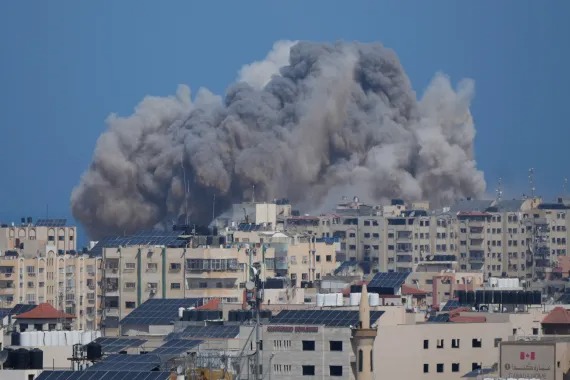Amid the escalating conflict between Israel and Hamas, Russia’s ambassador to the United Nations, Vassily Nebenzia, has called for a “humanitarian ceasefire” in the Gaza Strip and Israel. Nebenzia, while presenting a draft resolution to the UN Security Council, urged immediate action to halt the ongoing violence, secure the release of hostages, and strongly condemn acts of terrorism targeting civilians. The Russian proposal also seeks to ensure humanitarian aid access and the safe evacuation of civilians in distress. This initiative comes as tensions continue to rise, with the death toll mounting and the Gaza Strip left without essential services.
Russia Advocates for Peace Talks and a Palestinian State
Russia’s ambassador to the United Nations, Vassily Nebenzia, has taken a bold stance, calling for an immediate “humanitarian ceasefire” to quell the violence in the Gaza Strip and Israel. Nebenzia emphasized the need for the UN Security Council to act swiftly to bring an end to the bloodshed and, more importantly, to restart peace negotiations with the ultimate goal of establishing a Palestinian state. This call aligns with international expectations for the Security Council to play a pivotal role in resolving the long-standing Israel-Palestine conflict.
Russian Draft Resolution Receives Some Support
Following the presentation of the Russian draft resolution, there have been indications of positive responses among certain member states of the UN Security Council. This development suggests a potential opening for diplomatic efforts to address the Israel-Hamas conflict. The resolution, which calls for an “immediate” ceasefire, has also put a strong focus on the secure release of hostages, condemning all forms of violence against civilians, and addressing acts of terrorism. Furthermore, it emphasizes the importance of humanitarian aid access and the safe evacuation of civilians in desperate need, reflecting a concerted effort to mitigate the suffering of those caught in the crossfire.
Concerns Over the Draft Resolution and US Stance
While Russia’s proposal for a ceasefire has garnered support from some member states, concerns have been raised about the content of the draft resolution. Notably, the draft refers to Israel and the Palestinians but does not explicitly name Hamas, which is a significant player in the ongoing conflict. Critics argue that the omission of Hamas raises questions about the resolution’s seriousness and its alignment with the majority of council members. To move forward, a UN Security Council resolution requires at least nine votes in favor and no vetoes from the US, Britain, France, China, or Russia. The historically close relationship between the US and Israel has led to Washington shielding its regional ally from Security Council actions, leaving the potential fate of the resolution uncertain.
As the conflict intensifies, with Israel’s response to Hamas’ attacks proving deadly, the situation in Gaza has become increasingly dire. More than a million civilians were ordered to evacuate northern Gaza by Israel, which the UN deemed “impossible.” As a result, the region is experiencing shortages of water, electricity, and internet, exacerbating the humanitarian crisis. The rising death toll, particularly among women and children, has sparked global concern and further emphasizes the urgency of finding a resolution to the Israel-Hamas conflict.
In conclusion, Russia’s call for a “humanitarian ceasefire” and its draft resolution represent an attempt to address the ongoing violence in the Gaza Strip and Israel. The positive responses from some UN Security Council member states indicate a potential diplomatic opening, but concerns over the resolution’s content and the historical US-Israel alliance present challenges to its adoption. As the conflict continues to claim lives and exacerbate the humanitarian crisis, the need for international action and a lasting peace agreement becomes increasingly evident.
















